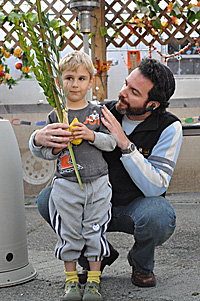By Janis Siegel, JTNews Correspondent
Some call it drive-by Judaism, when parents drop their kids at a synagogue for Hebrew school, take off to shop or grab some coffee, and then return to shuttle them home or out for a meal.
It is exactly the model Rabbi Olivier BenHaim of Bet Alef Meditative Synagogue is committed to changing.
When he and his staff open their startup Hebrew school in a new Northend Seattle location in October 2012, he’ll have his chance. Everyone will be all in: Parents, kids, and teachers, studying and meditating together.
“I certainly didn’t want to repeat that,” said BenHaim, speaking with JTNews about the need for Bet Alef’s new curriculum under development for what it will call its B’Yachad program. “We hope to create that spiritual ground at home.”
Also unique to Bet Alef is its approach to prayer, God, and the divine, which BenHaim called “panentheistic.”
“It’s the Kabbalah and the Chassidic master’s understanding of God,” BenHaim explained. “Everything is an expression of God’s likeness. There is no thing, no one, no where, no when that God is not. The transcendent is not the old-fashioned God-in-the-clouds. It is an authentic, Jewishly rooted, long-held, Jewishly grounded path.”
Longtime Bet Alef member Dianna Rose has been attending services there since she moved to Seattle from Sacramento, Calif., over 13 years ago. She and her 6-year-old son, Nathan, who will attend school there this fall, are one of 110 families who now belong to the synagogue.
“I was raised meditating in a multi-faith family,” Rose said. “I didn’t grow up in Hebrew school or Sunday school. This approach has a universal thread but it’s in a Jewish context. This is for people who don’t like to go to synagogue.”
Elizabeth Fagin, a Bet Alef member and its director of education, is developing the administrative and curricular side of the upcoming three-hour Saturday program. After a welcoming ceremony, adults will study with BenHaim. The children, ranging from grades 1 through 6, will study with teachers. Families will then reunite for Hebrew prayer, and to finish up with the remainder of the synagogue service.
“The programs that work the best are where parents and kids learn together, teaching each other,” Fagin said. “We’re going to provide them with the tools.”
Bet Alef’s formal Hebrew reading program will be self-paced. Its current B’nai Mitzvah program will eventually merge into the B’Yachad program. Fagin and BenHaim envision an eventual high school component to the school as well.
“This is going to be a very active classroom situation,” Fagin said. “There isn’t going to be a lot of book reading and frontal teaching.”
In addition to teaching meditation in the sanctuary and in the classroom, Fagin and BenHaim are organizing the core teaching content around “middot,” Jewish virtues and principles.
Covering one value a month for each of the nine months of school, students will use the Torah and Jewish biblical historical texts to explore the traditional stories through the lens of mindfulness, compassion, trust, service, loving kindness, truth, generosity, humility, and joy.
“In the Jewish community, we look at tikkun olam, tzedakah, and treating others as we want to be treated,” Fagin said. “We hold these as high values. In real life…the struggle comes when there is some kind of stressor, which is part of life, It’s hard to keep those values.”
That is where the meditation technique helps kids stay connected to these values, said Fagin, allowing them to become familiar with their reactions and to reflect on their behavior.
“You know that space between an action and your reaction?” she asked. “Meditation expands that space so that you really have more choice. Meditation for children is used quite widely in other settings, even in secular settings.”
BenHaim believes his congregation serves many adults and families who don’t feel at home in more conventional venues of Jewish worship.
“The kinds of people we attract are often from interfaith marriages,” BenHaim said. “It also helps a lot of people who have been disenfranchised in their early life.”
Rose said she found her spiritual home there and lauds its inclusiveness.
“There are Jew-Bus who are into Buddhism, people into Native American spirituality, and a lot who are more into mystical spirituality,” Rose said, “but their lineage is Jewish, so it is a way that they can incorporate that thread, using the language, culture, tradition and the Jewish liturgy.”
